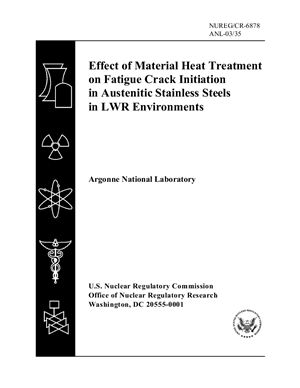65 стр.
Office of Nuclear Regulatory Research
U.S. Nuclear Regulatory Commission
Washington, DC 20555–0001
The ASME Boiler and Pressure Vessel Code provides rules for the design of Class 1 components of nuclear power plants. Figures I–9.1 through I–9.6 of Appendix I to Section III of the Code specify design curves for applicable structural materials. However, the effects of light water reactor (LWR) coolant environments are not explicitly addressed by the Code design curves. The existing fatigue strain–vs.–life (?–N) data illustrate potentially significant effects of LWR coolant environments on the fatigue resistance of pressure vessel and piping steels. Under certain environmental and loading conditions, fatigue lives of austenitic stainless steels (SSs) can be a factor of 20 lower in water than in air. This report presents experimental data on the effect of heat treatment on fatigue crack initiation in austenitic Type 304 SS in LWR coolant environments. A detailed metallographic examination of fatigue test specimens was performed to characterize the crack morphology and fracture morphology. The key material, loading, and environmental parameters and their effect on the fatigue life of these steels are also described. Statistical models are presented for estimating the fatigue ?–N curves for austenitic SSs as a function of material, loading, and environmental parameters. Two methods for incorporating the effects of LWR coolant environments into the ASME Code fatigue evaluations are presented.
Office of Nuclear Regulatory Research
U.S. Nuclear Regulatory Commission
Washington, DC 20555–0001
The ASME Boiler and Pressure Vessel Code provides rules for the design of Class 1 components of nuclear power plants. Figures I–9.1 through I–9.6 of Appendix I to Section III of the Code specify design curves for applicable structural materials. However, the effects of light water reactor (LWR) coolant environments are not explicitly addressed by the Code design curves. The existing fatigue strain–vs.–life (?–N) data illustrate potentially significant effects of LWR coolant environments on the fatigue resistance of pressure vessel and piping steels. Under certain environmental and loading conditions, fatigue lives of austenitic stainless steels (SSs) can be a factor of 20 lower in water than in air. This report presents experimental data on the effect of heat treatment on fatigue crack initiation in austenitic Type 304 SS in LWR coolant environments. A detailed metallographic examination of fatigue test specimens was performed to characterize the crack morphology and fracture morphology. The key material, loading, and environmental parameters and their effect on the fatigue life of these steels are also described. Statistical models are presented for estimating the fatigue ?–N curves for austenitic SSs as a function of material, loading, and environmental parameters. Two methods for incorporating the effects of LWR coolant environments into the ASME Code fatigue evaluations are presented.

